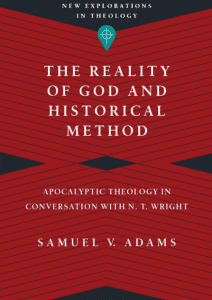 NT Wright is committed to “critical realism” and Samuel Adams — and his book The Reality of God and Historical Method is endorsed by Douglas Campbell, Douglas Harink, Bev Gaventa and Alan J. Torrance — thinks critical realism is insufficient to the task of theology. History, it is being argued, can only go so far. This is Adams’ central question:
NT Wright is committed to “critical realism” and Samuel Adams — and his book The Reality of God and Historical Method is endorsed by Douglas Campbell, Douglas Harink, Bev Gaventa and Alan J. Torrance — thinks critical realism is insufficient to the task of theology. History, it is being argued, can only go so far. This is Adams’ central question:
What is the epistemological significance of the object of knowledge if the object of knowledge is God? (66)
Adams’ concession/confession in a footnote: “The account of theological epistemology that I will provide in this chapter overcomes Meyer’s dichotomy between critical and precritical, rejecting any hint of a transcendental methodology, by moving deeper into the space opened up by Karl Barth’s theology, here represented by T. F. Torrance” (66 n. 1). Adams seems oblivious to how historians hear such a methodological orientation.
That central question is reframed into this: “Therefore, if Wright’s method is not purely pragmatic, but rather is committed to realism in both theology and history, then the question of the ontological status of the reality in question will be important precisely because of the way the “real” functions in critical realism” (69-70). Thus,
Can God, as an object of knowledge, be known in the same way as any other object, or does his unique ontological identity—unique with respect to every other object available for knowledge—demand a new, or modified, account of human knowing for just this object? (70).
Adams devotes this chp to a study of subject and object and turns things inside out in effect: first by establishing that all subjects are related to (make contact with) the objects they want to know. This means each area of knowledge (each object to be known) implicates the knower into a special kind of relation in order to know that object. The problem then is the radical distinction of subject from object.
Back again to the central question and how we know God: “If we are going to avoid a radical epistemological dualism between subject and object, then the resolution to our question regarding the relationship between theological knowledge and historical knowledge will need to follow Torrance when he writes that “how God can be known must be determined from first to last by the way in which He actually is known'” (74).
Adams thus thinks Wright’s critical realism is inadequate. Thus:
The argument to be pursued here is that the relationship between epistemology and history in Wright’s method, theologically understood, ought to begin with a theological epistemology determined by the object of knowledge. Historical knowledge, to the extent that it is focused on the knowledge of God (or “god”), must grapple with the nature of this unique object. … Theology is concerned with the knowledge of God, so the question of the adequacy of CRw [critical realism acc to Wright] to the object of theological discourse is the question of the adequacy of an account of epistemology to the subject matter of theology (76).
SMcK: I have wondered in reading this book if “theology” means the same thing for Wright that it does for Adams (and Torrance). Theology for Adams/Torrance is known by God’s soteriological revelation to the believer and knowledge derives from explicating that revelation. Thus, Adams is providing an epistemology for apocalyptic theology, which is the more recent version of a kind of Barthian crisis theology (right?).
Wright’s “worldview/story” grid through which the knower discovers truth is replaced in apocalyptic theology God’s revelation in Christ, which is a radical clarification and narrowing of what “worldview/story” might mean. Torrance, then, focuses on the actuality of knowledge (Jesus Christ as God’s revelation; [christocentrism]), the objectivity of knowledge (attachment to the object itself rather than detachment; thus, apart from a soteriology and new birth one can’t have objective knowledge of God), and the possibility of knowledge (grace of revelation of God in Christ). It is about participation in the Son’s knowledge of the Father.
Adams then reframes what “object” and “subject” mean by discussing Kierkegaard where the object is radically subjectivized. God determines the knowing subject: “the knowing subject is relationally dependent upon God’s ongoing revelation of himself as subject” (84). That is, “God as subject makes the individual subject in a relationship between subjects” (105).
















